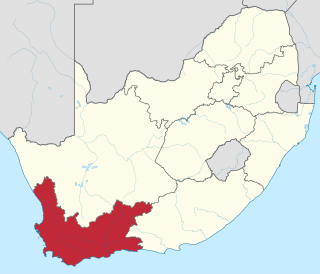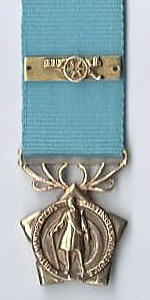
Cape Town is one of South Africa's three capital cities, serving as the seat of the Parliament of South Africa. It is the legislative capital of the country, the oldest city in the country, and the second largest. Colloquially named the Mother City, it is the largest city of the Western Cape province, and is managed by the City of Cape Town metropolitan municipality. The other two capitals are Pretoria, the executive capital, located in Gauteng, where the Presidency is based, and Bloemfontein, the judicial capital in the Free State, where the Supreme Court of Appeal is located.

Johan Anthoniszoon "Jan" van Riebeeck was a Dutch navigator and colonial administrator of the Dutch East India Company.

Coloureds refers to members of multiracial ethnic communities in Southern Africa who may have ancestry from more than one of the various populations inhabiting the region, including African, European, and Asian. South Africa's Coloured people are regarded as having some of the most diverse genetic background. Because of the vast combination of genetics, different families and individuals within a family may have a variety of different physical features.

The Western Cape is a province of South Africa, situated on the south-western coast of the country. It is the fourth largest of the nine provinces with an area of 129,449 square kilometres (49,981 sq mi), and the third most populous, with an estimated 7 million inhabitants in 2020. About two-thirds of these inhabitants live in the metropolitan area of Cape Town, which is also the provincial capital. The Western Cape was created in 1994 from part of the former Cape Province. The two largest cities are Cape Town and George.

Paarl is a town with 112,045 inhabitants in the Western Cape province of South Africa. It is the third-oldest city and European settlement in the Republic of South Africa and the largest town in the Cape Winelands. Due to the growth of the Mbekweni township, it is now a de facto urban unit with Wellington. It is situated about 60 kilometres (37 mi) northeast of Cape Town in the Western Cape Province and is known for its scenic environment and viticulture and fruit-growing heritage.

Bellville is a town in the Western Cape province of South Africa. It is situated adjacent to the Koelberg Mountains and also the University of Western Cape where it has its own campus.

The Progressive Federal Party (PFP) was a South African political party formed in 1977 through merger of the Progressive and Reform parties, eventually changing its name to the Progressive Federal Party. For its duration was the main parliamentary opposition to apartheid, instead advocating power-sharing in South Africa through a federal constitution. From the 1977 election until 1987 it was the official opposition of the country.

Oudtshoorn Municipality is a municipality located in the Western Cape Province of South Africa. As of 2011, the population was 95,933.

Colin Wells Eglin was a South African politician best known for having served as national leader of the opposition from 1977–79 and 1986–87. He represented Sea Point in the South African Parliament from 1958–61 and from 1974–2004. Described by Nelson Mandela as "one of the architects of democracy", Eglin played a leading role in the drafting of the country's post-apartheid constitution.

The City of Cape Town is the metropolitan municipality which governs the city of Cape Town, South Africa and its suburbs and exurbs. As of the 2011 census, it had a population of 3,740,026.

The South African Labour Party, was a South African political party formed in March 1910 in the newly created Union of South Africa following discussions between trade unions, the Transvaal Independent Labour Party, and the Natal Labour Party. It was a professedly democratic socialist party representing the interests of the white working class.

The Van Riebeeck Decoration, post-nominal letters DVR, is a South African military decoration for bravery which was instituted by the Union of South Africa in 1952. It was awarded to officers for distinguished service in the field.

The Mayor of Cape Town is the head of the local government of Cape Town, South Africa; currently that government takes the form of the City of Cape Town Metropolitan Municipality. In the past, the position of Mayor has varied between that of an executive mayor actively governing the city and that of a figurehead mayor with a mostly ceremonial role. The current mayor is Geordin Hill-Lewis of the Democratic Alliance (DA)

Afrikaners are a South African ethnic group descended from predominantly Dutch settlers first arriving at the Cape of Good Hope in the 17th and 18th centuries. They traditionally dominated South Africa's politics and commercial agricultural sector prior to 1994. Afrikaans, South Africa's third most widely spoken home language, evolved as the mother tongue of Afrikaners and most Cape Coloureds. It originated from the Dutch vernacular of South Holland, incorporating words brought from the Dutch East Indies and Madagascar by slaves. Afrikaners make up approximately 5.2% of the total South African population, based upon the number of White South Africans who speak Afrikaans as a first language in the South African National Census of 2011.
The House of Delegates was a body in the Tricameral Parliament of South Africa which existed from 1984 to 1994. It was reserved for Indian South Africans. The body was elected twice; in 1984 and 1989. It was the second time in South Africa's history that Indians had ever had any sort of representation at the national level, the first being the South African Indian Council. It was originally to be called the Chamber of Deputies.
Major Pieter Voltelyn Graham van der Byl MC was a South African soldier and statesman. In South African politics, he was a member of the liberal South African Party and then the United Party from 1929 to 1966 and a member of Jan Smuts' cabinet from 1939 to 1948, during which time, he was minister of Native Affairs. Major Piet was a chevalier de la Légion d'Honneur, Honorary Colonel of the University of Cape Town Regiment, as well as receiving the Military Cross and the King George VI Coronation Medal.

The Cape Town Philharmonic Orchestra (CPO) is an orchestra based in Cape Town, Western Cape, South Africa.
The following is a timeline of the history of Cape Town in the Western Cape province of South Africa.

The Groote Kerk is a Dutch Reformed church in Cape Town, South Africa. The church is South Africa's oldest place of Christian worship, built by Herman Schuette in 1841. The first church on this land was built in 1678. Willem Adriaan van der Stel laid the cornerstone for the church. It was replaced by the present building in 1841, but the original tower was retained. The pulpit is the work of Anton Anreith and the carpenter Jacob Graaff, and was inaugurated on 29 November 1789. The Groote Kerk lays claim to housing South Africa's largest organ, which was installed in 1954 and has 5917 pipes.
Benedicta Maria van Minnen is a South African politician and a member of the Democratic Alliance. She has been a Member of the National Assembly since 22 May 2019. Previously, she served as a councillor in the City of Cape Town.
















